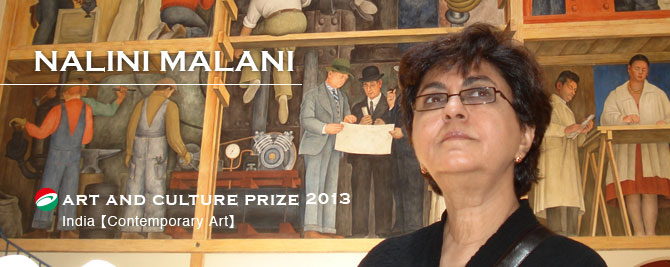posted on
02 Jul 2013
Indian artist and Thai filmmaker awarded top Japanese Art and Culture Prize

Indian contemporary artist Nalini MALANI and Thai filmmaker Apichatpong WEERASETHAKUL have both been awarded the 24th Fukuoka Art and Culture Prize 2013. The artists will visit Fukuoka in Southern Japan for the prize awarding ceremony and the forum to be held in September
Mr. Apichatpong Weerasethakul is a groundbreaking filmmaker from Thailand, involved not only in producing and directing but also in script-writing and editing, who has been creating a sensation in the cinematographic world. His innovative method of ‘visual narration’ -- set in a dense forest, stories based on local folktales and legends are mixed with personal memories, episodes from previous lives, and also with comments on current issues -- has won international acclaim.
Ms. Nalini Malani is a leading Asian artist who has been internationally acclaimed for her large-scale spatial art combining installation and paintings. Her challenging themes, current and universal, include religious conflicts, war, oppression of women and environmental destruction, focused on the recent history of the Indian Subcontinent.
Nalini MALANI was the first participating artist in the Fukuoka Asian Art Museum art residence program. In commemoration of her prizewinning, the FAAM is now planning to hold a commemorative exhibition to show her works at the time of her visit to Fukuoka.
The Grand Prize was awarded to Japanese medical doctor Nakamura Tetsu and the Academic Prize went to Australian Tessa Morris-Suzuki.
As Japan's cultural gateway, Fukuoka City has since antiquity played a significant role in promoting exchanges with other regions of Asia. This history, and a determination to promote and understand the distinctive cultures of Asia, and to further peace, inspired the inauguration of the Fukuoka Prize (Fukuoka Asian Culture Prize) in 1990 through collaboration between academia, businesses, and the city authorities. Since then, there have been many prize recipients from almost every region of Asia.
The Fukuoka Prize is a means of showing respect to those who have made outstanding contributions to academia, arts, and culture in Asia. It intends, together with the people of Fukuoka, to advertise to the world through the city, the diversity and the distinctiveness of Asian culture.
Similar content
posted on
04 Jul 2018
posted on
25 Jun 2015
posted on
01 Jul 2016
posted on
09 Sep 2016
posted on
06 Jun 2019
posted on
13 Jun 2017





